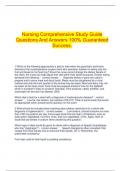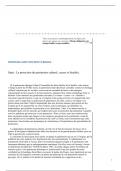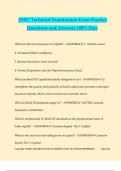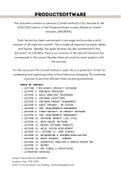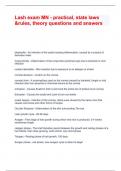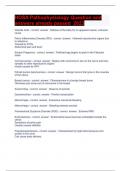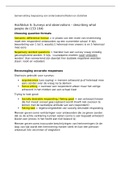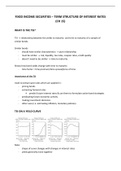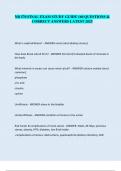Chapter 1
Science:
- Publicness (accessibility, transparency to public, open to scrutiny)
- Adherence to the scientific method (constrained to follow the rules of scientific
method)
Subjectivists: research interpreting the meaning and reflecting on the reasons for human
action. Argue that one cannot fully separate the observation of social facts from values and
theoretical notions.
Positivists: social reality is not set in stone but constructed and reconstructed through a
variety of social processes. Social reality is inter-subjective.
- Empiricism and scientific realism (both positivist): disagree on the ways to conduct
research
o Empiricist deny reality to unobservable entities
o Empiricists are interested in successful prediction and intervention and care
little about understanding the underlying structure of the world
o Scientific realists strive for a deep understanding that goes beyond the
instrumental uses of scientific results
Examples of pure empiricists: game theory, public opinion, electoral
campaigns
Quantitative: numbers or statistics
Qualitative: dense case studies
Minimal definition of science:
- Measurement should be done in replicable way that achieves valid representations of
the underlying concepts
- Theoretical ideas should be internally consistent and have clear and precise
observable implications
- Sciences is characterised by
o Being public and transparent, and
o Adherence to certain rules regarding theory development, measurement,
inherence from data
Political science:
- Polity: political organisation of nations, state, government
- Politics: political processes, decision-making
- Policy: making and implementation, evaluation of public policies
1
,Chapter 2: Types of research and research questions
Empirical research can be: descriptive, predictive and explanatory
Research:
- Most fundamental distinction:
- Normative (ethical): what ought to be. Normative research is prescriptive. Why is X
better than Y?
- Positive: used to be, will be. Is descriptive, predictive or explanatory. Positive
questions focus on describing, understanding, explaining or predicting reality as it is.
The focus is on empirical phenomena, on the links between empirical phenomena
and theoretical concepts.
Description (present):
- Describe the world as it is, assigns facts into classes or categories
- Collect facts to interpret a case, can be used as evidence
- Inference: making valid statements about the whole from observing only one part
- Scientific description is not confined to analysing individual facts and processes in
isolation
- The discovery of association between social phenomena is also part description
- Great overlap between: exploration and description
- Exploration can be regarded as an advanced form of description
Prediction (future):
- Projections about empirical phenomena and processes in the future (forecasting)
- Predictions can be data-driven and need not to be based on a causal model
- To predict and to explain are different activities
Explanation:
- Causes of events, identify general causes effects, and reveal the causal mechanisms
that produce them
- Explain a particular case, build a comprehensive causal account of a general
phenomenon or to establish a general causal relationship that holds for a population
of cases
- Can be about specific events or general phenomena
- Attempt to provide a complete account of how and why certain events happen
- Anthropology: from explanation to interpretation. Interpretation can be regarded as
a specific form of explanation
- Causal explanations offer “deep” understanding and the possibility for manipulation
and control. Explaining means understanding the causal structure, which in its turn
implies the ability to manipulate this structure to change the outcomes.
2
, Explanations are intrinsically related to theory, because it is theory that supports
explanatory accounts.
1. Empirical research can be used to generate a theory
2. It can test a theory
3. It can be used to apply an existing theory
We have positive, empirical and explanatory research as a goal: it needs to be specified
whether we will generate, test or apply an existing theory.
Theory generation:
- Follows once a series of events is traced and documented, it is easy to propose
conjunctures how the events are causally related
- Once variation across populations is systematically explored, it is difficult to avoid
forming hypothesis about causal relationships
- The source of initial theoretical insights is descriptive
- The process is inductive: starts with empirical facts and builds its way up to abstract
theoretical assumptions
Theory testing:
- Can be accomplished by using a variety of methods
- New theory can be tested with a small number of case studies to establish its basic
credibility
- Theory testing is deductive: start with abstract propositions and put them to the test
of empirical reality: the ones that are not disconfirmed survive, and the ones that do
not match get discarded
Theory application:
- Applying a theory to explain a case has a very narrow ambition and little care is given
to the question of how the findings from the research relate to the body of existing
theory
- theory application is more often suited for private than academic purposes
Improving a research question:
- Short, grammatically simple, structurally simple, open-ended, general concepts,
choose the Wh… word carefully, make sure the question reflects the research goal,
drop normative language, proof-read and edit.
3


